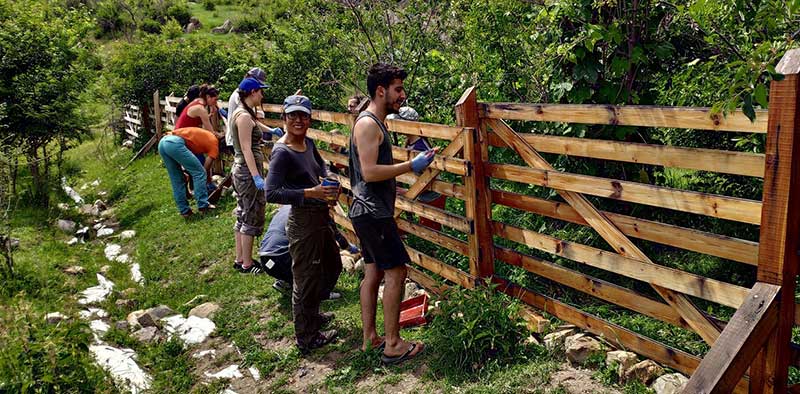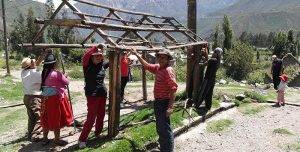International Workcamps

Volunteering and international solidarity!
You have finished a language course programme with the SVI and now wish to apply these new skills? You want to travel and put your time into a local association or an NGO by volunteering abroad?
You will also get to support smaller local associations, meet other young local or international people, and practise the local language (or English) on a daily basis.
What is the difference between volunteering and humanitarian aid?
Humanitarian aid is about:
- Sending qualified workers (e.g. doctors, logisticians).
- Responding to emergency situations (e.g. wars, natural disasters, economic crises).
- People who put their skills to help and work on behalf of a population in need.
- Specific missions.
Volunteering, on the other hand, is about:
- No specific skills.
- Motivated volunteers.
- Volunteers who are not actually helping, but who support and contribute to a project organised by local non-profit associations.
Our main goal is to facilitate a cultural immersion through volunteering for an association abroad. We are thus talking about “projects”, not “missions”. It may seem like a tiny lexical detail, but it is important to us!
Going on a voluntary project with the SVI: How does it work?
With the SVI, you can choose between about 2000 associative voluntary projects related to animal, social, cultural, artistic, educational, or environmental issues. We offer projects in Europe, but also in Africa, India, and many other destinations.
These kinds of voluntary projects abroad are a good way to experience life in a community while learning through non-formal education. Even better: it is a way to put into practice and improve previously learnt languages!
Joining a group of participants to volunteer abroad makes you contribute to a common project on a short period of time. You can go alone, in a group of two or more! The best part? THERE ARE NO AGE LIMITS OR REQUIRED SKILLS! All you need is to be curious, enthusiastic and, most importantly, mo-ti-va-ted! Still, being able to get by with English is an undeniable advantage, especially to make sure you understand the project progress and can communicate with other volunteers. On certain international voluntary projects, you may meet French speakers, but mainly people from diverse nationalities: that’s where English becomes important if you want to take part in real intercultural exchanges! Also, being able to speak the tongue of the country you’re visiting is a necessity to communicate with locals and understand their culture at best.
The most important thing to pay attention to when it comes to choosing a project: its theme! Many projects are offered, and it is sometimes quite hard not to get lost. The one question you need to think through before making your decision is: how will I contribute? If you choose a theme that suits you better and that you feel more comfortable with, you’ll be more likely to live a fulfilling experience which both you and the local association will benefit from.
 And what about work?
And what about work?
It depends on the project! And, by the way, we don’t employ the term “work” but rather “activities”. Generally, volunteers are busy 30 hours a week and perform some specific tasks that are overseen by a local team leader (who is part of the local association). They also have leisure time to visit the region with the rest of the volunteers. International work camps were not made to replace actual full-time employees, but to give them a hand and contribute to their activities in a spirit of solidarity.
And what about money?
Volunteers have to pay:
- Membership fees to the SVI
- Mobility fees (transports, administrative procedures like for their VISA, vaccines, insurance, etc.)
- Participation fees (which can vary depending on the local association). Participation fees usually cover predeparture training, but also organisation, management, accommodation, and food costs. Some associations also organise collective activities for their volunteers.
To conclude
What is expected on an international voluntary project is to have a sense of community, sharing, curiosity, mutual respect, and being able to face your own stereotypes. Everyone is responsible for the success of this common project through their commitment. These international solidarity projects are real opportunities to discover new cultures, languages, local customs, and these of the other international volunteers.
What are you waiting for? Stop hesitating and sign up! ?
